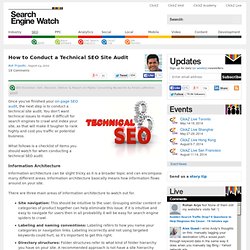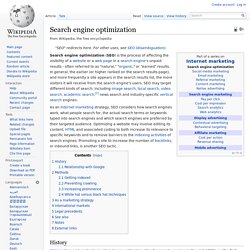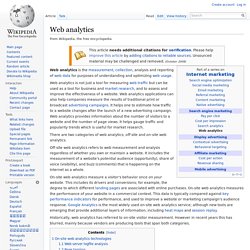

Technical / site search engine optimization. Once you’ve finished your on-page SEO audit, the next step is to conduct a technical site audit.

You don’t want technical issues to make it difficult for search engines to crawl and index your site, as that will make it tougher to rank highly and cost you traffic or potential business. What follows is a checklist of items you should watch for when conducting a technical SEO audit. Information Architecture Information architecture can be slight tricky as it is a broader topic and can encompass many different areas. Information architecture basically means how information flows around on your site. There are three main areas of information architecture to watch out for.
Site navigation: This should be intuitive to the user. Server Response Codes There are few server response codes that can have an impact on your technical SEO audit, for example 301, 302, and the dreaded 404. A 301 response code means that the requested page has been permanently moved to a new location. Crawling/Indexing Issues. Content search engine optimization. As an Internet marketing strategy, SEO considers how search engines work, what people search for, the actual search terms or keywords typed into search engines and which search engines are preferred by their targeted audience.

Optimizing a website may involve editing its content, HTML and associated coding to both increase its relevance to specific keywords and to remove barriers to the indexing activities of search engines. Promoting a site to increase the number of backlinks, or inbound links, is another SEO tactic. The plural of the abbreviation SEO can also refer to "search engine optimizers", those who provide SEO services.
History Early versions of search algorithms relied on webmaster-provided information such as the keyword meta tag, or index files in engines like ALIWEB. By relying so much on factors such as keyword density which were exclusively within a webmaster's control, early search engines suffered from abuse and ranking manipulation. Web analytics. Web analytics is not just a tool for measuring web traffic but can be used as a tool for business and market research, and to assess and improve the effectiveness of a website.

Web analytics applications can also help companies measure the results of traditional print or broadcast advertising campaigns. It helps one to estimate how traffic to a website changes after the launch of a new advertising campaign. Web analytics provides information about the number of visitors to a website and the number of page views. It helps gauge traffic and popularity trends which is useful for market research. There are two categories of web analytics; off-site and on-site web analytics. Off-site web analytics refers to web measurement and analysis regardless of whether you own or maintain a website. On-site web analytics measure a visitor's behavior once on your website. Historically, web analytics has referred to on-site visitor measurement.
On-site web analytics technologies[edit] Page tagging[edit] Search analytics. Search analytics is the analysis and aggregation of search engine statistics for use in search engine marketing (SEM) and search engine optimization (SEO). In other words, search analytics helps website owners understand and improve their performance on search engines. Search analytics includes search volume trends and analysis, reverse searching (entering websites to see their keywords), keyword monitoring, search result and advertisement history, advertisement spending statistics, website comparisons, affiliate marketing statistics, multivariate ad testing, et al.
Services[edit] Last updated: 2013-007-07 Data collection[edit] Search analytics data can be collected in several ways. Since search results, especially advertisements, differ depending on where you are searching from, data collection methods have to account for geographic location. Accuracy[edit] Search analytics accuracy depends on service being used, data collection method, and data freshness. Market conditions[edit]